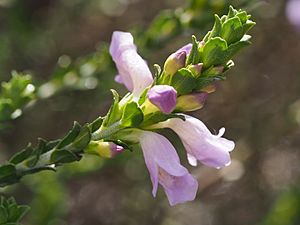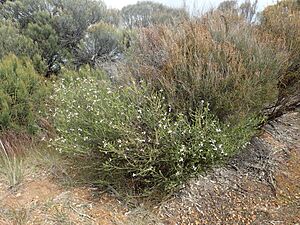Eremophila lehmanniana facts for kids
Quick facts for kids Eremophila lehmanniana |
|
|---|---|
 |
|
| Eremophila lehmanniana leaves and flowers | |
| Scientific classification | |
| Genus: |
Eremophila (plant)
|
| Species: |
lehmanniana
|
| Synonyms | |
|
|
Eremophila lehmanniana is a beautiful flowering plant that belongs to the figwort family, called Scrophulariaceae. This plant is special because it is found only in Western Australia. It usually grows as an upright shrub with short, wide leaves that often have jagged edges. Its flowers can be white or a lovely lilac color. You can find this plant growing in the south west part of Western Australia.
Contents
What Eremophila lehmanniana Looks Like
Eremophila lehmanniana is a shrub that grows upright, sometimes spreading out. It usually reaches a height of about 0.5 and 2.5 m (2 and 8 ft) (1.6 to 8.2 feet). Its leaves grow one after another along the branches. They sometimes overlap each other.
The leaves are usually shaped like an oval or an egg. They are mostly 4–10 mm (0.2–0.4 in) (0.16 to 0.39 inches) long and 2–5 mm (0.08–0.2 in) (0.08 to 0.20 inches) wide. When they are young, the leaves are often shiny and a bit sticky. They also tend to have noticeable, rounded "teeth" along their edges.
Flowers and Fruits
The flowers usually grow one by one where a leaf meets the stem. Each flower sits on a smooth stalk that is up to 4 mm (0.2 in) (0.16 inches) long. There are five green, overlapping, spear-shaped sepals, which are small leaf-like parts that protect the bud. These sepals are 2–4 mm (0.08–0.2 in) (0.08 to 0.16 inches) long.
The petals are 7–11.5 mm (0.3–0.5 in) (0.28 to 0.45 inches) long. They are joined together at the bottom to form a tube. The outside of this petal tube is white to lilac, while the inside is white. There are also pale yellow-brown spots on the lowest petal part. Both the outside and inside of the petal tube are smooth. However, the inside of the tube is full of long, soft hairs. The four stamens (the parts that produce pollen) are completely hidden inside the petal tube.
This plant flowers from July to November. After flowering, it produces dry fruits with a hard outer layer. These fruits are oval-shaped and 2.5–4 mm (0.1–0.2 in) (0.10 to 0.16 inches) long.

How it Got its Name
This plant was first officially described in 1848 by a scientist named Otto Wilhelm Sonder. He gave it the name Halgania lehmanniana. This description was published in a book called Plantae Preissianae by Johann Georg Christian Lehmann in the same year.
Later, in 1981, another scientist named Robert Chinnock changed its name to Eremophila lehmanniana. The second part of its scientific name, lehmanniana, is a way to honor the botanist J.G.C. Lehmann, who published the first description.
Where it Grows
Eremophila lehmanniana can be found in a wide area of Western Australia. It grows between the towns of Esperance and Geraldton. You can find it in several different natural areas, including the Avon Wheatbelt, Coolgardie, Esperance Plains, Geraldton Sandplains, and Mallee regions.
This plant grows in many different types of soil. It usually prefers to grow in open woodland areas, which are like forests but with more space between the trees.
Conservation Status
The Western Australian Government's Department of Parks and Wildlife has looked at this plant. They have classified Eremophila lehmanniana as "not threatened." This means that there are enough of these plants in the wild, and they are not currently in danger of disappearing.
Growing Eremophila lehmanniana in Gardens
This type of Eremophila is a very tough plant, which makes it great for gardens that don't need a lot of care. It has been grown successfully in all the mainland states of Australia. It can handle cold temperatures, even as low as −6 °C (20 °F) (21.2 degrees Fahrenheit).
It's quite easy to grow new plants from cuttings (small pieces of the plant). This plant can grow in most types of soil, including clay. It likes to be in full sun or partial shade. It only needs water occasionally during long dry periods. It can even grow in humid places like Sydney, though it might need some protection from very strong winds there.

